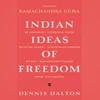Indian Ideas of Freedom
Author: Dennis Dalton
Publisher: Harper Collins
Pages: i-ix + 518
Price: Rs. 699
This book offers us a fascinating intellectual history of the idea of freedom in modern India. It introduces us to the distinctive character of Indian political thought; at the same time, it maps out the factors that make Indian imaginations of freedom uniquely modern.
This is a revised and updated version of Dennis Dalton’s well-known book Indian Idea of Freedom, which was published in 1982. The author has made a significant attempt to expand the scope of his earlier study by incorporating the intellectual political contributions of B R Ambedkar and Jayaprakash Narayan. That is the main reason the present version of the book has a slightly open-ended title Indian Ideas of Freedom.
The structure of the book has been intelligently reworked to provide a new sequence to the main arguments of this study. The book begins with a short but extremely insightful Foreword written by Ramachandra Guha. It is followed by two slightly long introductory comments: “A Memoir of India”, which is based on a few autobiographical reflections by Dr Dalton on his intellectual association with India; and a formal “Introduction”, which provides a theoretical background to the question of freedom in the Indian context.
In a way, these introductory comments are crucial to understanding Dr Dalton's framing of intellectual biographies of seven thinkers: Swami Vivekananda, Aurobindo Ghose, M K Gandhi, Rabindranath Tagore, B R Ambedkar, M N Roy and Jayaprakash Narayan. Dr Dalton makes an important theoretical move: He historicises the life stories of these individual thinkers to understand the contextual dynamics of their moral-philosophical claims. The ideas of freedom, hence, are not given to us as abstract-normative ideals or formulations; instead, Dr Dalton makes an attempt to present a life story of political imaginations. This may be the reason he uses the expression “journey theorists” for these individuals.
This feature is an important aspect of our modern public life. These political thinkers did not write thick academic treatise in the conventional university framework (even Ambedkar, who was a trained academic in the proper sense of the term, did not prefer to write only for the academic public. His most celebrated work, Annihilation of Caste, was a public lecture). On the contrary, these individuals recognised the significance of political action in order to conceptualise a set of ideas. Their theories, therefore, remain ever-evolving and flexible.
While acknowledging the uniqueness of the thought-process of each thinker, the author tries to find a common thread, an intellectual coherence in their ideas of freedom. To do justice to this highly challenging intellectual task, Dr Dalton identifies four important issues: Preservation by reconstruction; reimaging religion/God as a political resource; rethinking individual-society relationship and, finally, method of change or political action. He finds an interesting churning of these ideas in the writings of these thinkers, which is creatively used to address the challenges posed by colonial modernity.
So, what is the principal feature of the Indian notion of freedom? A close reading of the book suggests that the author does not want us to take the Western meanings of liberty as a point of departure to evaluate the Indian intellectual investment in the concept of freedom. He underlines the fact that Indian political thinking offers us a comprehensive and multifaceted notion of freedom. In this sense, the quest for individual liberty, struggle to emancipate society from backward-looking attitudes and the movement for national freedom from colonial rule were inextricably linked. The end of colonial rule in 1947 was a significant moment in this journey. Yet, it does not mean that the struggle for greater independence in the political realm becomes a settled issue. The chapter on Jayaprakash Narayan is relevant in this regard where freedom is understood as an unfinished post-colonial project.
A critical point needs to be highlighted here. It is about the method of exclusion. The term “Indian ideas” is not entirely an apolitical entity. Dr Dalton’s Memoir as well as his brilliantly written Introduction recognise the critical role played by public debates in shaping the political universe, at least in ideological terms. The inclusion of Ambedkar in the present version of the book shows that the author is fully aware of the Dalit intellectual critique. He is also conscious of the fact that post-colonial Indian political thinking is equally vibrant and creative.
Yet, the scope of the “Indian ideas of freedom” remains confined to the territorially restricted imagination of India as a geo-political entity. Obviously, it is easy to describe Hindu, Jain, Buddhist and even Sikh traditions as Indian traditions because these religions originated in the Indian subcontinent. However, this cannot be the case with Indo-Islamic or Indo-Christian political thinking. Serious scholars of political ideas, such as Dr Dalton, find it difficult to accommodate these traditions in their theoretical universe. For them, the “West versus India” binary is intellectually attractive and politically non-controversial, especially in the present context.
Hindutva sympathisers will not find this book problematic because it has Vivekananda (if not Savarkar!). And no one would remind readers of this thought-provoking book that it completely ignores Indo-Islamic political thinking, especially the works of Maulana Abul Kalam Azad, who wrote extensively on the multifaceted idea of freedom in the Indian context and even preferred to be called Azad or free!
The reviewer is associate professor, Centre for Study of Developing Societies
Unlock 30+ premium stories daily hand-picked by our editors, across devices on browser and app.
Pick your 5 favourite companies, get a daily email with all news updates on them.
Full access to our intuitive epaper - clip, save, share articles from any device; newspaper archives from 2006.
Preferential invites to Business Standard events.
Curated newsletters on markets, personal finance, policy & politics, start-ups, technology, and more.
)